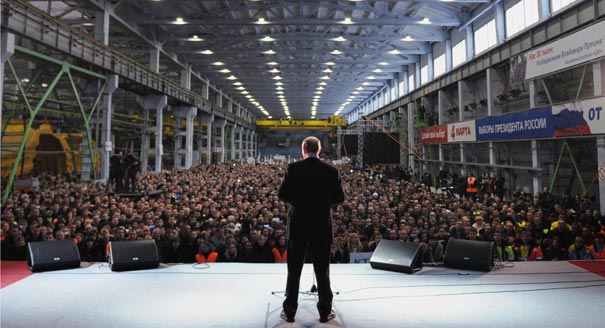Vladimir Putin secured his return to power in Sunday’s Russian presidential election. Though that result came as no surprise, the issue of what will come next for Russia is still an open question.
I would not exclude the possibility that victorious Putin might want to exact some kind of revenge and punish his opponents for all their criticism, protests, and general disobedience. The increased pressure on the Russian mass media, the search for terrorists plotting to eliminate the leading candidate on the eve of the election, and Putin’s statement on the opposition’s possible plans to assassinate some well-known politician in order to provoke unrest in the country all underscore the likelihood of this outcome.
A harsher response from the authorities to ongoing protests against fraud and violations in the presidential election is possible as well. Frightened by the thought of a second round of voting, the authorities pulled out all the stops over the weekend and many election violations were reported.The Kremlin will also continue to crack down on the Russian mass media, especially on electronic outlets—and it might even tighten its grip. Ninety-nine percent of all television programs will remain the official powers’ sanctuaries. The authorities will also continue their search for means by which to turn up the heat on Internet discussions. Studying China’s and Iran’s success in this area keeps Russian law-enforcement officials up at night.
If this proves to be the Russian authorities’ response to the recent events, it would appear that the state is having a “nervous breakdown” of sorts. There are certainly plenty nervous people in the Kremlin right now.
What should we expect in the more distant future?
All the political reforms announced by now-outgoing president Dmitri Medvedev—such as direct elections of regional governors and amendments to the election code—will commence. However, all these reforms are tactical rather than strategic. They reflect the ruling class’s overarching goal of preserving its power at all costs—even if that power has to be retouched a bit with vague democratic strokes.
The party system will be reformed, resulting in the disappearance of the unpopular, heavy-handed United Russia, which looks to have worn out its welcome. New political parties, including some liberal parties, will replace the outdated, outspent organizations, and the Communist Party will be partially reconstructed.
The issue of the Kremlin’s relations with the “informal opposition” will be resolved according to the opposition’s willingness to play by the Kremlin’s rules. If some of the opposition leaders abide by the rules, they will later be allowed into the State Duma. New starts and starlets will also appear on Russia’s political horizon.
I believe that the most important issue will be whether the current ruling class realizes that Russian society has gone through fundamental and possibly irreversible changes, that the old way of governing the state has become ineffective and largely useless. While Putin has returned as president of Russia, “Putinism” as a model of state governance, designed to serve one person whose authority was based on a small clan of close associates, is no more.





